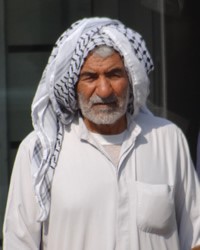Arab, Iranian in Iran

Photo Source:
Adam Jones - Flickr
Creative Commons
|
Send Joshua Project a map of this people group.
|
| People Name: | Arab, Iranian |
| Country: | Iran |
| 10/40 Window: | Yes |
| Population: | 596,000 |
| World Population: | 596,000 |
| Primary Language: | Arabic, Mesopotamian |
| Primary Religion: | Islam |
| Christian Adherents: | 0.30 % |
| Evangelicals: | 0.29 % |
| Scripture: | New Testament |
| Ministry Resources: | Yes |
| Jesus Film: | Yes |
| Audio Recordings: | Yes |
| People Cluster: | Arab, Arabian |
| Affinity Bloc: | Arab World |
| Progress Level: |
|
Introduction / History
Arabs are believed to be descended from Abraham's son Ishmael. Until the seventh century A.D., they lived almost entirely in the Arabian Peninsula. In that century, the prophet Mohammed founded the religion of Islam, and the Arabs began a process of conquest that would spread them, their language, and their culture across much of Africa and Asia. As they migrated, many Arabs settled in present-day Iran. Before that time there was only a little contact between the Arab and the Persian peoples.
Today Arabs are especially concentrated in a vast area extending from western Morocco to eastern Iraq. About one million Arabs have spilled across the Iraqi-Iranian border to live in Iran. Mostly, they inhabit the province of Khuzestan, in the southwestern corner of Iran, though some have moved to other parts of the country. Like nearly all Arabs, Iranian Arabs speak Arabic, a Semitic language. They speak either the Gulf Arabic dialect or the somewhat similar Mesopotamian Arabic dialect. This language is very different from Farsi, the official language of Iran.
What Are Their Lives Like?
Iranian Arabs have remained culturally isolated from most other Iranians. They have a great variety of lifestyles. Some live in cities, some in villages. Some are poor farmers; others are wealthy businessmen.
Although they remain devoted Muslims, in cities such as Khorramshahr and Abadan and in large towns there has been a gradual decline of traditional practices among Iranian Arabs. For example, those living in cities generally give women a greater degree of freedom than those in rural areas. Urban Arabs also arrange marriages less frequently than those in rural areas. Iranian Arabs in urban areas may be employed as bureaucrats, technicians, and industrialists. Many are unskilled workers.
In contrast, the Iranian Arab living in rural areas continue to practice a traditional lifestyle, resisting change in any form. Their daily lives are governed by values and rules of conduct that are centuries old. Villagers are loyal to their communities, have high standards of hospitality, and tend to place great emphasis on family honor. Most rural Iranian Arabs earn a living through fishing or farming. Their major crops include grains and vegetables.
In villages, marriages are arranged by the parents. Most often, girls wed between the ages of 14 and 19, while boys usually marry at an older age. Traditionally, Arabs have preferred their children to marry a cousin. Since Islamic law discourages any type of interaction between the sexes, many couples meet for the first time on their wedding day.
Iranian Arab children are treated very differently according to sex. Boys are pampered and granted their every wish by their mothers. Girls are not treated as tenderly. In villages, when a boy becomes old enough, he goes to work in the fields with his father; a girl stays at home and helps her mother cook and care for the younger children.
What Are Their Beliefs?
Most Iranians are Shia Muslims, including the Iranian Arabs. Ironically, some are converting to Sunni Islam to defy the Tehran regime. Islam, a religion based on works, has five key "pillars." First, all Muslims must profess that there is only one God and that Mohammed was his prophet. Second, Muslims are required to pray facing Mecca, Islam's holiest city. Third, they must give alms to the poor. Fourth, all Muslims are required to participate in ceremonial fasting, especially during the month of Ramadan. Finally, Muslims are required to make at least one pilgrimage to Mecca, if possible.
What Are Their Needs?
Iranian Arabs have great spiritual needs. Iran is completely closed to the gospel. No form of Christian witness is allowed, and Muslim converts to Christianity are mercilessly persecuted.
Prayer Points
Pray that Iranian Arabs would see the JESUS Film and hear Christian radio.
Pray that soon there will be Iranian Arab disciples making more disciples.
Pray for the Lord to give their elders and family leaders dreams of the risen and righteous Christ.
Pray for Iranian Arabs to have hearts that seek spiritual truth.